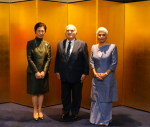You are here
Our election agenda in the Trump era
Oct 29,2018 - Last updated at Oct 29,2018
The “Trump era” has posed special challenges for Arab Americans not only in foreign and domestic policy, but also in confronting the hostile political culture which the president has nurtured. As a result, we have been busy, especially in this election season, forced to work on many fronts, all at the same time.
Not since the 1980s have we seen so many Republican campaigns using anti-Arab or anti-Muslim bigotry against Democratic opponents, with most instances tied to charges that the Democrat: has received financial support from questionable sources, from the Arab sounding names on their donors lists; is supported by individuals who are opponents of Israel or supporters of the Boycott, Divestment, Sanctions (BDS) movement; are themselves linked by family ties to Palestinian terrorism; or are just not sufficiently supportive of Israel or Trump’s moving the embassy to Jerusalem.
In addition, there has been an uptick in anti-Muslim, anti-immigrant — or more recently, Trump’s “unknown Middle Easterners” — scare tactics that have contributed to making this a challenging and important election. What follows is a snapshot of the many issues and areas that define our agenda as we approach critical mid-term elections.
First and foremost is our basic commitment to preparing Arab Americans for the election through voter registration, voter education and voter mobilisation. This is the “bread and butter” of our work. As we have seen in the past, the best antidote to attacks is to become stronger. And so this year, “Yalla Vote” organisers were hired to register new voters in their communities, build networks of volunteers and strengthen relationships with community organisations. With the support of this volunteer network, more than 50 “Yalla Vote” registration events were organised across the country. The effort now shifts to preparing to get out the Arab American vote on November 6.
We are especially proud of the fact that this year, a record number of Arab Americans filed for US House, US Senate or Gubernatorial seats, with dozens more running in local races. Because they will not face any opposition in November, two exciting and historic candidates have won: Rashida Tlaib in Michigan and Ilhan Omar in Minnesota. Both Rashida, a Palestinian American, and Ilhan, a Somali/Yemeni American, will be the first Muslim women to serve in Congress.
The campaign still to watch is that of Ammar Campa-Najjar, a Palestinian/Mexican American running in California. Ammar, a Democrat, is running an extraordinary race and polling well within the margin of error in what is considered a heavily Republican district. Most likely owing to the closeness of the contest, his Republican opponent has launched a vicious campaign of the worst anti-Arab and anti-Muslim bigotry we have seen in a congressional race in some time.
In addition to these newcomers, Arab American incumbents expected to easily win re-election in November are four Republican Congressmen, Representatives: Darin LaHood of Illinois, Ralph Abraham and Garret Graves of Louisiana and Justin Amash of Michigan. So if all goes well, come January, there may be seven Arab Americans in Congress.
Now to the issues we are addressing.
In July we published “Underreported, Under Threat: Hate Crime in the United States and the Targeting of Arab Americans”. Our report provides a long overdue analysis of targeted violence against Arab Americans and exposes multiple issues that affect hate crime reporting and data collection across the country. We are now working with members of Congress to address these issues and identify bipartisan action on the problem of underreporting as a 2019 priority for our hate crime work.
Two years ago, we began legislative work on combating the rampant decades-old problem of discrimination against Arab Americans during air travel. Last week, that work bore fruit. President Trump signed the new Federal Aviation Administration reauthorisation bill, which includes a section we worked on requiring training policy for its employees and contractors regarding racial, ethnic and religious non-discrimination.
In the next year, we will face a number of challenges to free speech in the form of state and federal government efforts to place penalties on individuals or groups that support BDS against Israel and other efforts to broaden the definition of anti-Semitism to include criticism of Israel. These initiatives seek to silence pro-Palestinian human rights activism on college campuses and ongoing work in a number of mainstream Christian denominations to divest their church funds from Israeli enterprises.
Additionally, we continue to address a range of other concerns that affect not only our community but all Americans; issues like opposition to the Muslim and refugee ban, immigration reform that protects diversity and family unification, opposition to government surveillance programmes that infringe on civil liberties and support for a compassionate policy on the admission of refugees.
It is, to be sure, a full agenda. But it is one we are ready to take on because we know we must — in order to insure the future of our community and our country.
The writer is president of the Washington-based Arab American Institute













